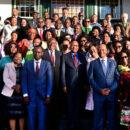“Someone willing to help people like me”: Uganda’s LGBTQ paralegals

Queer Ugandans who face discrimination often find it impossible to get legal support. But some are training as paralegals so they can help each other.

Some LGBTQ community paralegals in Uganda, facing away from the camera to shield their identities. Credit: John Okot.
This March, when Sammy’s landlady told him he was being evicted from his house in Kampala, the reason seemed straightforward: he was behind on rent. But when he approached her to see if he could pay what he owed in instalments, she told him the real reason. Rumours were circulating that Sammy* was gay and his landlady wanted no part in what she called his “weird lifestyle”.
For many members of the LGBTQ+ community, situations like this are common. Queer Ugandans frequently face discrimination or much worse. There are many reports of LGBTQ+ persons being killed or tortured by security agents.
Queer people are also persecuted by the law. Uganda’s penal code still criminalises same-sex acts through colonial era laws against “carnal knowledge against the order of nature”. And although the 2014 anti-homosexuality act, which increased penalties against LGBTQ+ persons, was repealed by the courts, it sanctioned a climate of greater hostility towards sexual minorities.
Recently, however, a small group of LGBTQ+ Ugandans have been trying to use the law to fight back. Two local non-profits have been training queer people to act as “community paralegals” to provide legal assistance to people like Sammy.
“[Community] paralegals are responders in times of crisis,” says Hajjati Abdul Jamal Uthuman, the founder of Rainbow Mirrors, which began trainings earlier this year. “They understand what members of the community go through because they are [part] of them.”
Sammy had come across Rainbow Mirrors, which has so far trained ten paralegals, on social media and approached them after talking to his landlady. He was assigned a paralegal who explained that it is illegal to evict someone without giving at least three months’ notice. The adviser then approached the police and Sammy’s landlady who agreed to give her tenant the required notice. Rainbow Mirrors even went a step further by helping Sammy, a hairdresser who was out of work because of the COVID-19, pay the first two months’ rent in his new place.
Sammy’s relief was beyond measure. “I was happy to learn there was someone out there willing to help people like me,” he says. “As a gay person, you feel a bit safe when the person helping you is also part of the LGBTI community. They are in a better position to fully understand every bit of problems that you are going through.”
This is a sentiment that Mercy Patricia Alum, who trains paralegals, says is common. She is a legal associate for the Human Rights Awareness and Promotion Forum (HRAPF), which has trained 96 queer Ugandans to be community paralegals since 2010 as well as several members of other marginalised communities such as sex workers and women living with HIV. HRAPH is also now planning to sponsor some community paralegals to become lawyers.
“Most lawyers here don’t like taking cases that involve LGBTQ people. This makes it hard for [queer people] to get justice,” says Alum. “There are few LGBTQ lawyers like me but the good thing is that work is made light because I work with community paralegals who also help us to connect and extend our support to LGBTQ clients who might not know where to seek for help in times of trouble.”
Paralegals don’t represent clients in court, but they inform them of their rights, help them get bail, mediate with authorities and do important paperwork. That makes them essential allies for Ugandans with no knowledge of the legal system and especially those who might otherwise feel pressured into pleading guilty.
According to Justine Bayla, a legal officer at HRAPH, security forces often target LGBTQ+ people with questionable petty offences. They accuse them of being a “rogue”, “vagabond” or “common nuisance” and charge them with being “idle and disorderly”. Fearing that their sexual orientation will be exposed or that they’ll be given harsher punishments if they plead innocent, Bayla says that many victims who don’t get legal support simply accept the charges.
Allan Nsubuga, the project director at Rainbow Mirrors, adds that the fact that the law “remains ambiguous” makes it easier for the police to target members of the LGBTQ+ community unjustly.
Paralegals can provide invaluable legal support to queer Ugandans. But as prominent human rights lawyer and activist Nicholas Opiyo points out, this fixes just one part of the problem. The biggest issue, he says, is deeply entrenched “negative social attitudes” that lead the law to be misapplied in the first place.
“The paralegal programme is a good thing but it is just a part of the large ecosystem to help LGBTQ people access justice system here in Uganda. LGBTQ people are still looked at as aliens because there is still cultural biases among people which contributes to the pervasive misapplication of laws towards them,” he says.
For broader change, Opiyo believes that the law itself must be amended to punish people who preach discrimination and hatred towards the LGBTQ community. At the same time, he argues, long term sensitisation efforts are needed to change attitudes.
This is something Sammy knows all too well. He has now moved home and resumed work, thanks to Rainbows Mirrors providing support when no one else would, but his challenges as a gay man in Uganda are far from over.
“My colleagues at the workplace don’t know that I’m gay. I intend to keep it that way because I’m afraid of how they will see me,” he says, looking down. “But when I save enough money, I want to open up my saloon soon. That way, I can work freely with people who will accept me for who I am.”
*name changed to protect his identity





